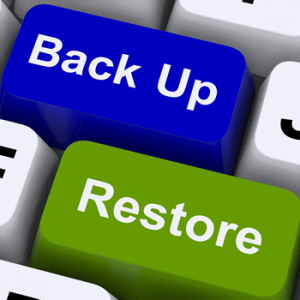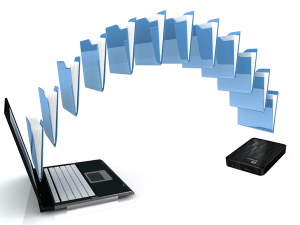Backup Software
 Backup Software: a reader asks…
Backup Software: a reader asks…
I’d like to use an automated backup service for my Windows laptop computer. What do you think about CrashPlan?
I’ve previously looked at other automated solutions like Mozy and Carbonite, and a quick perusal of CrashPlan shows much of the same sort of capabilities and usage. Where CrashPlan comes out in front though, is that they keep backup copies of files even after you’ve deleted them from your computer. So if months go by and you realize you deleted that report you shouldn’t have, you can get it back.
But I’ll tell you that in a real-world situation, here’s what’s going to happen:
- Your computer’s hard drive will crash, your laptop will be stolen or lost, or you’ve dropped it and broken it.
- You find out that fixing your old computer will cost more than half the cost of a brand new laptop, so you decide to buy a new laptop.
- You setup the new laptop and find out that you can’t just restore the backup from your service, so you only restore the personal files from your backup.
Trying to do a full restoration from one specific computer (model/type) to a different one is going to be an exercise in frustration. Much of your software and operating system configurations are computer-specific, so they would only create configuration problems that you’d have to sort out. The only time that a full restoration would work is if you had a simple hard drive crash and replaced the hard drive, using the same computer. If you switch to a different computer, you are much better off just setting up the new computer, installing your software on it, and restoring just your personal files (documents, music, pictures, etc.).
 That said, there’s no reason why you couldn’t use an online service like CrashPlan to backup those personal files. Of course, buying, installing and configuring the program to work is easy, and CrashPlan only costs $5/month ($60/year), well worth not having to worry about your personal files being backed up. But I have to tell you, backing up is the easy part. Restoring your data files can be more complicated, and if you’re not familiar with how that works (and you won’t be), trying to figure that out under pressure can be difficult. Each of these online backup services have their own process for restoring (which is not a trivial process), and you will have to go through that process in order to get your new computer up and running.
That said, there’s no reason why you couldn’t use an online service like CrashPlan to backup those personal files. Of course, buying, installing and configuring the program to work is easy, and CrashPlan only costs $5/month ($60/year), well worth not having to worry about your personal files being backed up. But I have to tell you, backing up is the easy part. Restoring your data files can be more complicated, and if you’re not familiar with how that works (and you won’t be), trying to figure that out under pressure can be difficult. Each of these online backup services have their own process for restoring (which is not a trivial process), and you will have to go through that process in order to get your new computer up and running.
 The only way to really know how this restoral process works is to practice it. Of course, nobody is going to spend the time to do this, which means that when you’re in the stressful situation of having to restore a backup, it’s going to take longer and be harder than it would otherwise. It’s this reason more than any other why I recommend folks do manual backups (I have a handy guide here), and suggest you buy a cheap external hard drive to do your backups.
The only way to really know how this restoral process works is to practice it. Of course, nobody is going to spend the time to do this, which means that when you’re in the stressful situation of having to restore a backup, it’s going to take longer and be harder than it would otherwise. It’s this reason more than any other why I recommend folks do manual backups (I have a handy guide here), and suggest you buy a cheap external hard drive to do your backups.
You can do them occasionally, or as often as your worry about data lost drives. Personally, I’m fine with monthly backups. If you don’t move your laptop very often, then you can just leave the external hard drive attached and let Windows’ built-in File History handle the backups automatically for you.
On that note, I should say that restoring a Windows’ File History backup onto a new computer is very easy compared to the various backup services. Just plug your external hard drive into the new computer and run File History and it’ll recognize that history backup and let you restore that to your new computer. Very easy and only takes a few clicks and enough time to copy all those files up to the new computer.
But if you’d prefer to pay an online service to manage your backups, by all means CrashPlan is one of the leaders in the consumer backup world. Just one more thought to leave you with:
If you’ve stayed away from cloud-based online file storage (dropbox, Google Drive, etc.) for security concerns, be aware that online file backup services have the same concern. Your personal data files are stored online and available via the internet. Their security is only as good as your login credentials (username, password and possibly 2-factor authentication) and the company’s ability to prevent their servers from being hacked.
Ok, one more thought: I should say that I’m much less concerned about online file service companies’ security practices (despite the recent Yahoo hack), I do find that users tend to use simple passwords and neglect 2-factor authentication. This makes them ripe targets for hacking, regardless of anything else. Please do yourself a favor and use a good password. What makes a good password?
A good password has more than 13 characters (20+ characters is great for now), and isn’t used on multiple online locations.
The requirements for character-complexity (using combinations of letters, numbers, and special type-able characters) is much less important than the simple length of the password. Really strong passwords can be a simple sentence, typed with no spaces or punctuation. Such as:
ihatereallylongpasswordsbecausetheytaketoolongtotype
The chances for hackers to crack a password like that are astronomical. Nuff said.
This website runs on a patronage model. If you find my answers of value, please consider supporting me by sending any dollar amount via:
or by mailing a check/cash to PosiTek.net LLC 1934 Old Gallows Road, Suite 350, Tysons Corner VA 22182. I am not a non-profit, but your support helps me to continue delivering advice and consumer technology support to the public. Thanks!






